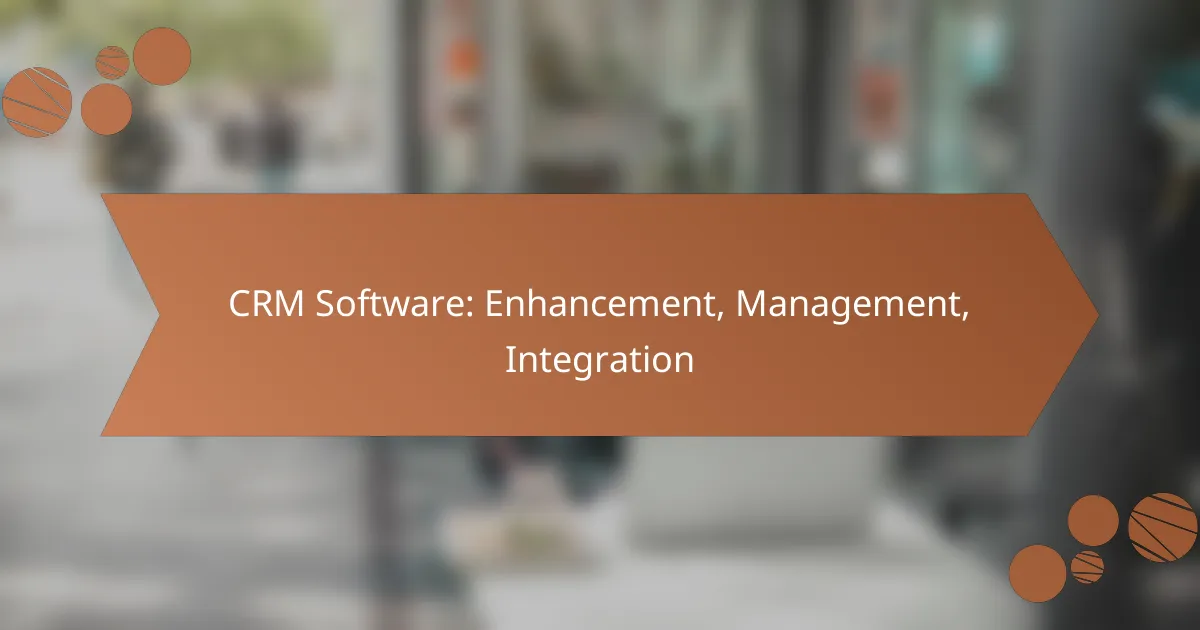CRM software plays a crucial role in enhancing customer management and streamlining sales processes for businesses. By centralizing customer data and providing insightful analytics, these tools enable companies to better understand and engage with their customers, ultimately improving satisfaction and loyalty. Popular options like Salesforce, HubSpot, and Zoho offer unique features tailored to meet the diverse needs of e-commerce and other industries.
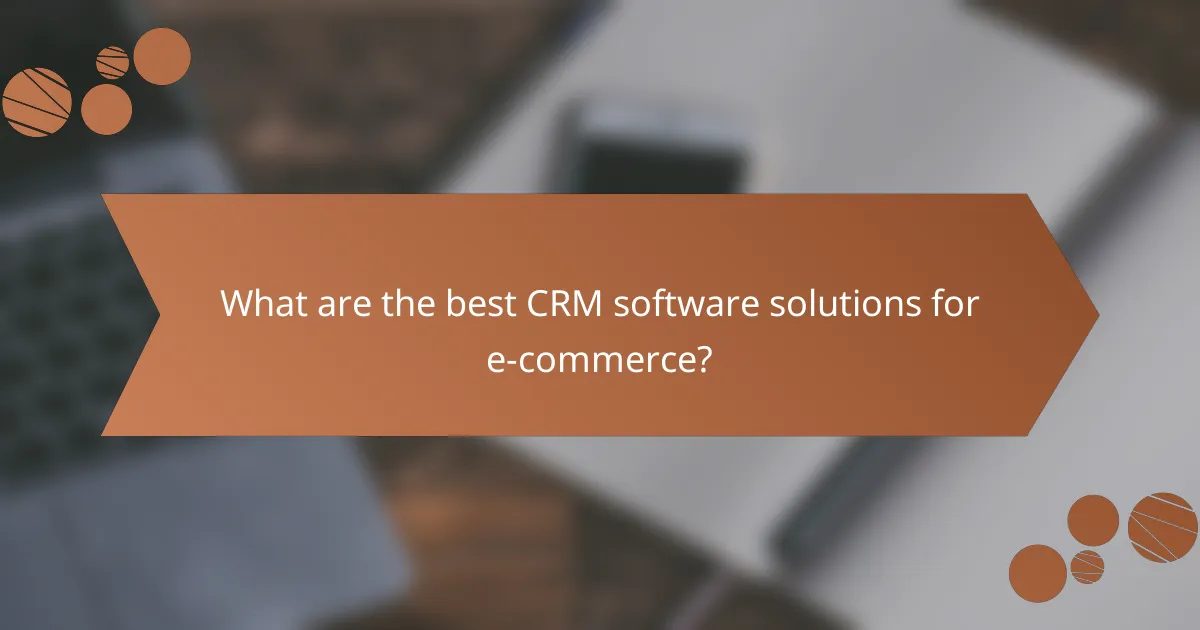
What are the best CRM software solutions for e-commerce?
The best CRM software solutions for e-commerce streamline customer interactions, enhance sales processes, and improve overall customer satisfaction. Key options include Salesforce, HubSpot, Zoho, Microsoft Dynamics 365, and Freshsales, each offering unique features tailored to e-commerce needs.
Salesforce CRM
Salesforce CRM is a leading solution known for its extensive customization capabilities and robust analytics. It allows e-commerce businesses to manage customer relationships effectively by integrating sales, marketing, and customer service functions.
Consider Salesforce if you require advanced reporting tools and automation features. However, be aware that its pricing can be on the higher side, making it more suitable for medium to large enterprises.
HubSpot CRM
HubSpot CRM is popular for its user-friendly interface and free tier, making it accessible for small to medium e-commerce businesses. It offers essential features like contact management, email tracking, and lead generation tools.
HubSpot’s integration with its marketing and sales hubs enhances its functionality, allowing for seamless customer journey tracking. However, advanced features may require a paid subscription.
Zoho CRM
Zoho CRM provides a comprehensive suite of tools at a competitive price, making it ideal for budget-conscious e-commerce businesses. It includes features such as sales automation, analytics, and multi-channel communication.
Its flexibility allows for customization to fit specific business needs, but some users may find the interface less intuitive compared to other options. Zoho also offers various integrations with popular e-commerce platforms.
Microsoft Dynamics 365
Microsoft Dynamics 365 is a powerful CRM solution that integrates seamlessly with other Microsoft products, making it suitable for businesses already using the Microsoft ecosystem. It offers advanced analytics, AI-driven insights, and customizable workflows.
This CRM is particularly beneficial for larger e-commerce operations that require detailed reporting and extensive data management. However, the complexity may pose a learning curve for new users.
Freshsales
Freshsales is designed for small to medium-sized e-commerce businesses, offering a straightforward interface and essential CRM features such as lead scoring, email tracking, and sales automation. Its affordability makes it an attractive option for startups.
Consider Freshsales if you need a simple, effective CRM without overwhelming features. While it may lack some advanced capabilities of larger CRMs, it provides solid functionality for managing customer relationships efficiently.
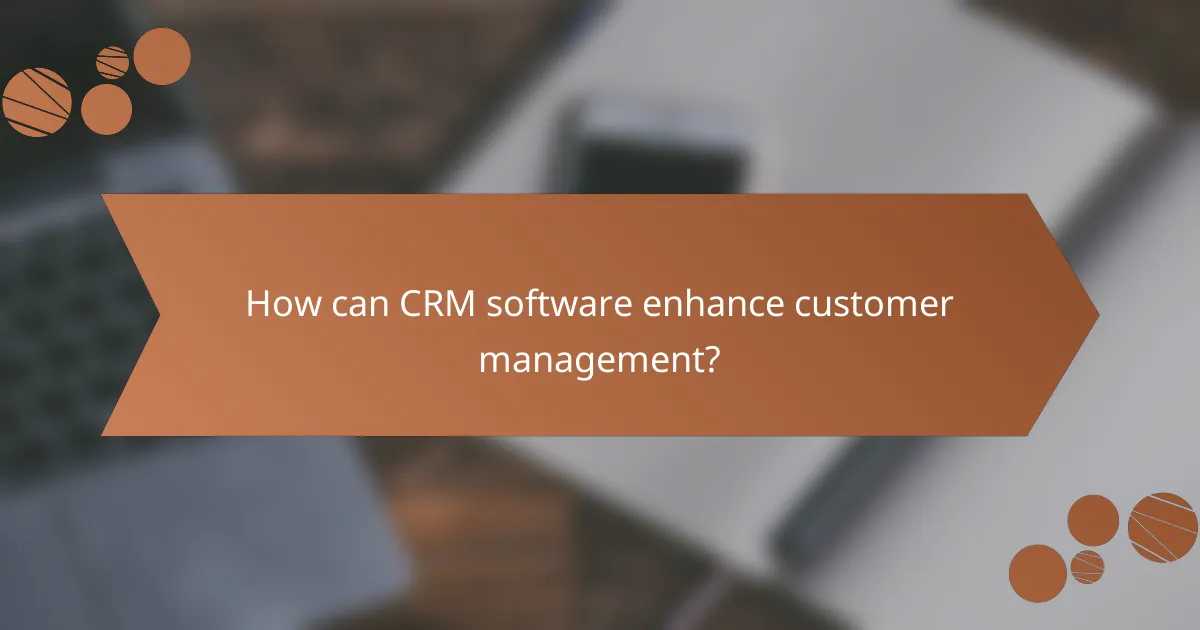
How can CRM software enhance customer management?
CRM software enhances customer management by centralizing customer data, streamlining interactions, and improving overall service quality. By leveraging these tools, businesses can better understand customer needs and preferences, leading to more effective engagement strategies.
Improved customer insights
CRM systems provide businesses with valuable insights into customer behavior and preferences. By analyzing data such as purchase history, communication patterns, and feedback, companies can identify trends and tailor their services accordingly.
For example, a retail business can use CRM analytics to determine which products are popular among specific customer segments, allowing for targeted promotions. Regularly reviewing these insights can help businesses stay ahead of customer expectations.
Automated communication
Automation in CRM software allows for timely and consistent communication with customers. Features such as automated email responses, follow-up reminders, and scheduled messages ensure that customers receive prompt attention without requiring constant manual effort.
For instance, a company can set up automated birthday greetings or reminders for upcoming appointments, enhancing customer satisfaction and engagement. However, it’s crucial to balance automation with personalization to avoid sounding robotic.
Personalized marketing campaigns
CRM software enables businesses to create personalized marketing campaigns based on detailed customer profiles. By segmenting customers according to their interests and behaviors, companies can tailor their messaging to resonate more effectively.
For example, a travel agency might send customized offers to clients based on their previous trips or preferences. This targeted approach can significantly increase conversion rates and customer loyalty. Businesses should regularly update their customer data to ensure the relevance of their marketing efforts.
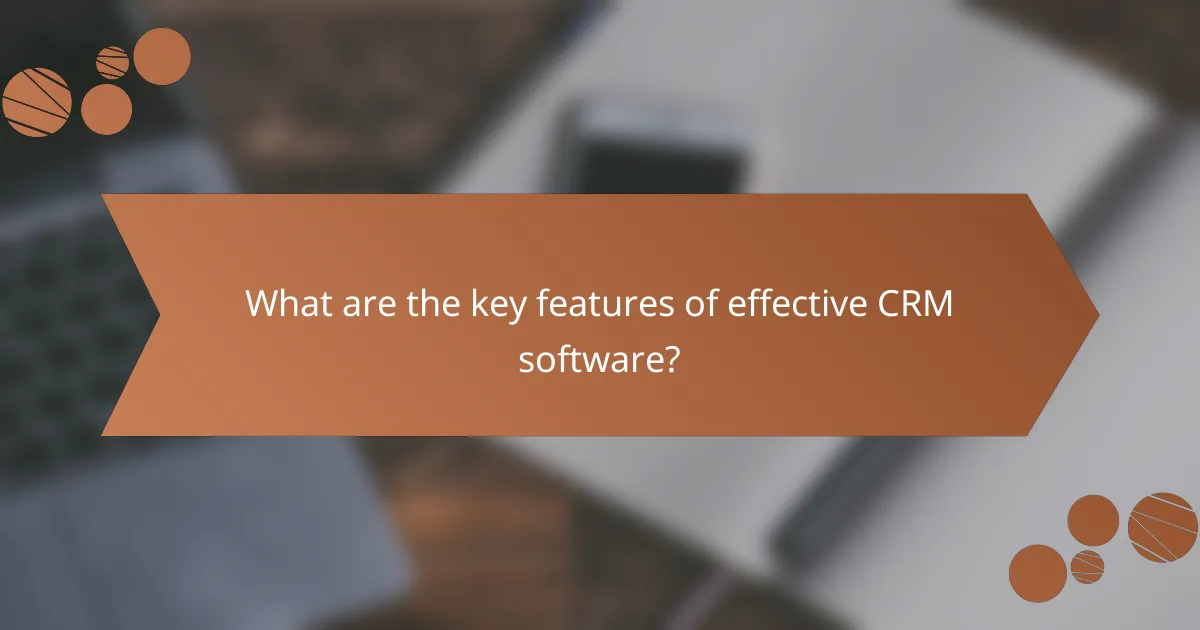
What are the key features of effective CRM software?
Effective CRM software typically includes features that enhance customer relationships, streamline sales processes, and provide insightful analytics. Key functionalities such as contact management, sales tracking, reporting, and integration capabilities are essential for maximizing business efficiency and improving customer satisfaction.
Contact management
Contact management is a fundamental feature of CRM software that allows businesses to store and organize customer information in a centralized database. This includes details such as names, email addresses, phone numbers, and interaction history, making it easy to access and update client profiles.
Effective contact management enables personalized communication and targeted marketing efforts. Businesses should ensure their CRM allows for easy segmentation of contacts based on various criteria, such as demographics or purchase behavior, to enhance engagement strategies.
Sales tracking
Sales tracking features in CRM software help businesses monitor their sales pipeline and track individual deals from initial contact to closure. This functionality provides visibility into sales activities, allowing teams to identify bottlenecks and optimize their sales processes.
Utilizing sales tracking tools can improve forecasting accuracy and help sales teams prioritize leads. Companies should look for CRMs that offer customizable sales stages and automated reminders to keep their teams on track and responsive to customer needs.
Reporting and analytics
Reporting and analytics capabilities are crucial for evaluating the effectiveness of sales strategies and customer interactions. CRM software should provide customizable reports that highlight key performance indicators (KPIs), such as conversion rates and customer acquisition costs.
Effective analytics tools can help businesses identify trends and make data-driven decisions. Companies should prioritize CRMs that offer visual dashboards and easy-to-understand metrics, allowing for quick assessments of performance and areas for improvement.
Integration capabilities
Integration capabilities allow CRM software to connect with other business tools and platforms, such as email marketing services, accounting software, and e-commerce systems. This seamless connectivity enhances data flow and ensures that all customer-related information is synchronized across platforms.
When selecting a CRM, businesses should consider the ease of integration with their existing systems. Look for CRMs that offer APIs or built-in integrations to facilitate smooth operations and reduce manual data entry, ultimately saving time and minimizing errors.
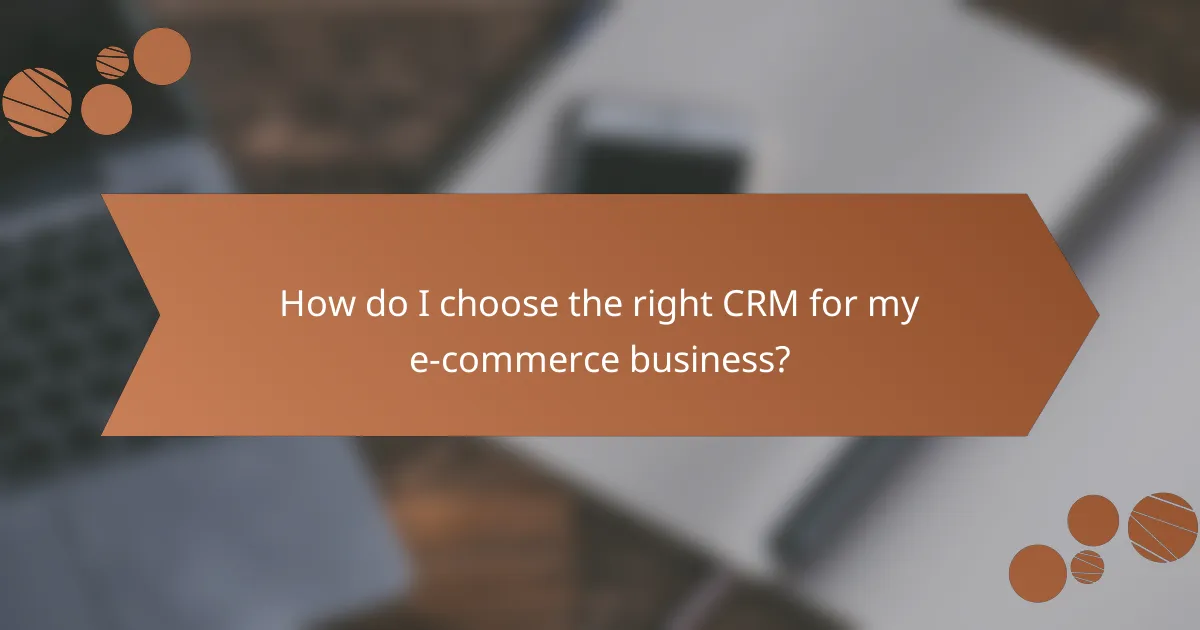
How do I choose the right CRM for my e-commerce business?
Choosing the right CRM for your e-commerce business involves understanding your specific needs, evaluating pricing structures, and considering future growth. A well-selected CRM can streamline customer interactions, enhance sales processes, and improve overall efficiency.
Assess business needs
Start by identifying the key functionalities your e-commerce business requires from a CRM. Consider aspects such as customer segmentation, sales tracking, and integration with existing platforms like payment processors and inventory management systems.
Engage your team in discussions to pinpoint pain points in current processes. This will help you prioritize features that can address these issues, such as automation tools or reporting capabilities.
Evaluate pricing models
CRM pricing can vary widely, often based on the number of users, features, and support levels. Common models include subscription-based pricing, which can range from low tens of USD per month for basic plans to several hundred for advanced features.
Look for trial periods or free versions to test functionality before committing. Be cautious of hidden costs, such as fees for additional users or integrations, which can significantly impact your budget.
Consider scalability
Scalability is crucial for e-commerce businesses anticipating growth. Choose a CRM that can grow with your business, offering additional features or user licenses as needed without requiring a complete system overhaul.
Assess whether the CRM can handle increased data volume and customer interactions. A flexible platform will allow you to adapt to changing market conditions and customer needs without substantial additional investment.
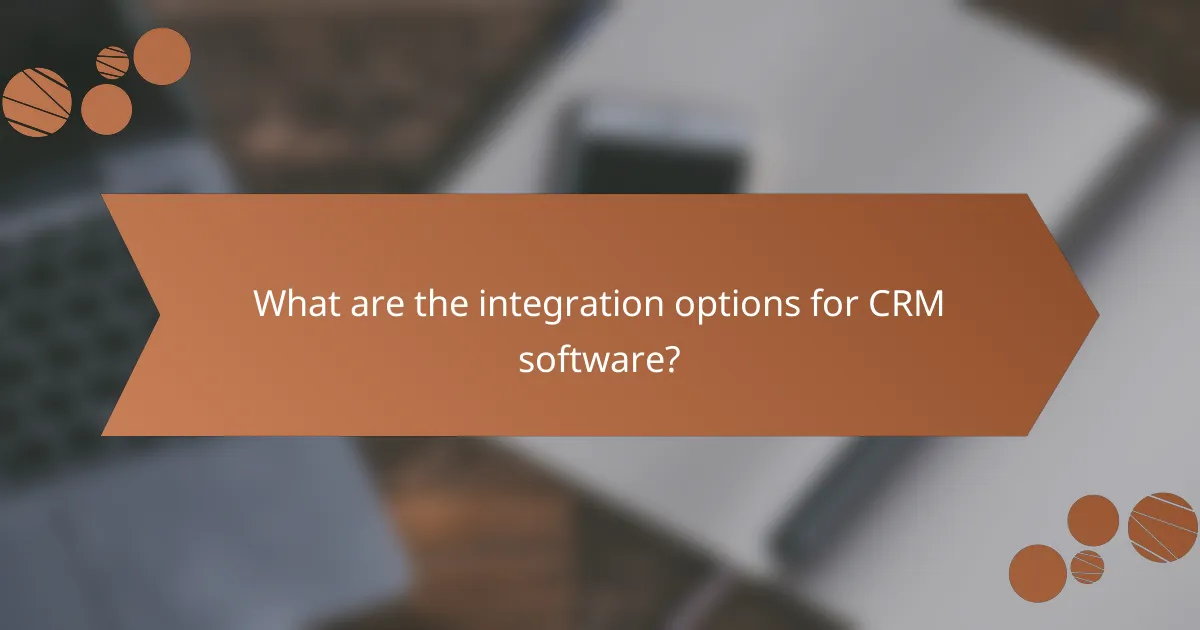
What are the integration options for CRM software?
CRM software offers various integration options to enhance functionality and streamline processes. Key options include API integrations, third-party app connections, and custom integration solutions, each catering to different business needs and technical capabilities.
API integrations
API integrations allow CRM systems to connect directly with other software applications, facilitating seamless data exchange. This method is highly efficient for businesses that require real-time updates and synchronization across platforms.
When considering API integrations, evaluate the availability of documentation and support from both the CRM and the external systems. Common integrations include email marketing tools, e-commerce platforms, and customer support systems.
Third-party app connections
Third-party app connections enable CRM software to link with popular applications through pre-built connectors or integration platforms. These connections simplify the integration process, often requiring minimal technical expertise.
Examples of third-party apps include project management tools, social media platforms, and accounting software. Look for CRM solutions that offer a marketplace or library of available integrations to choose from.
Custom integration solutions
Custom integration solutions are tailored specifically to a business’s unique requirements, allowing for a high degree of flexibility. This option is ideal for organizations with complex workflows or specific software needs that off-the-shelf solutions cannot meet.
While custom integrations can be more costly and time-consuming, they often result in a more cohesive system. Businesses should assess their budget, technical resources, and long-term goals before opting for this route.
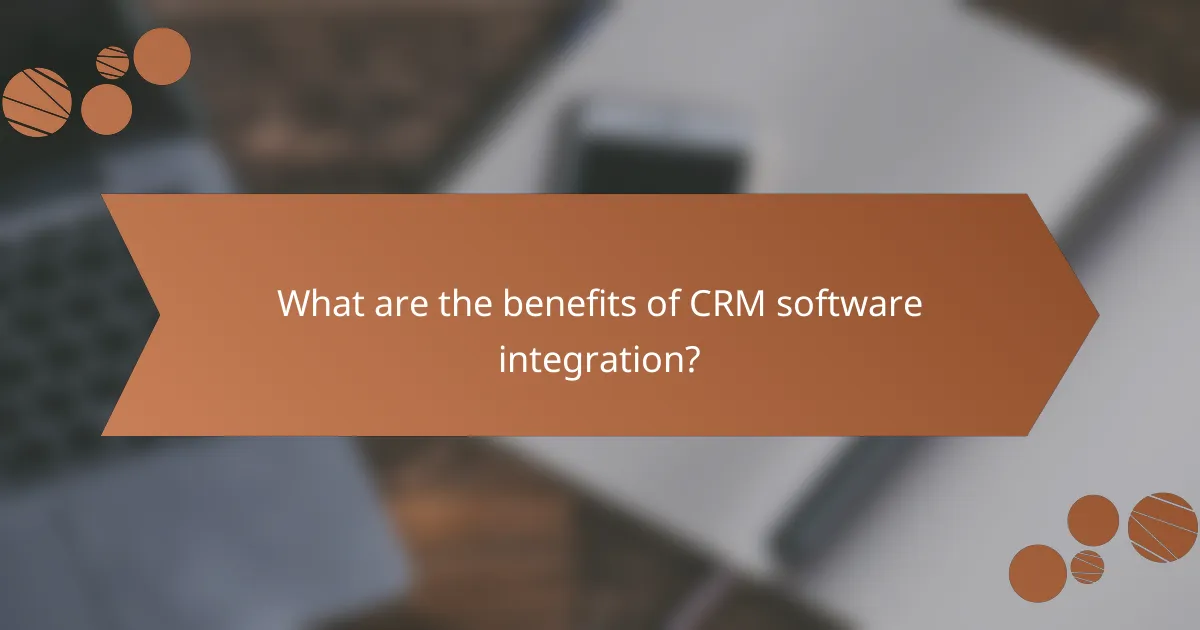
What are the benefits of CRM software integration?
CRM software integration offers significant advantages by streamlining data flow between various business applications. This connectivity enhances customer insights, improves operational efficiency, and fosters better communication across teams.
Improved Data Accuracy
Integrating CRM software with other systems reduces data entry errors and inconsistencies. When information is automatically synced across platforms, it ensures that all teams work with the most current and accurate data.
For example, if a customer updates their contact information in the CRM, that change will reflect across all integrated applications, such as email marketing tools and sales platforms. This real-time accuracy minimizes the risk of miscommunication and enhances customer service.
Enhanced Customer Insights
CRM integration allows businesses to gather and analyze data from multiple sources, leading to deeper customer insights. By combining sales data, customer interactions, and feedback from various channels, companies can identify trends and preferences.
This holistic view enables more personalized marketing strategies and targeted sales efforts. For instance, a business can tailor its outreach based on previous purchases and customer behavior, improving engagement and conversion rates.
Increased Efficiency
Integrating CRM software can significantly boost operational efficiency by automating routine tasks and reducing manual processes. This frees up employees to focus on higher-value activities, such as building relationships with customers.
Common integrations include linking CRM with email platforms, accounting software, and project management tools. This interconnectedness allows for seamless workflows, such as automatically generating invoices from sales data without manual input.
Better Collaboration
With integrated CRM systems, teams can collaborate more effectively by sharing information and insights in real time. This transparency fosters a unified approach to customer management and enhances teamwork.
For example, sales and marketing teams can access the same customer data, ensuring that both departments are aligned in their strategies and communications. This collaboration can lead to improved customer experiences and higher satisfaction rates.
